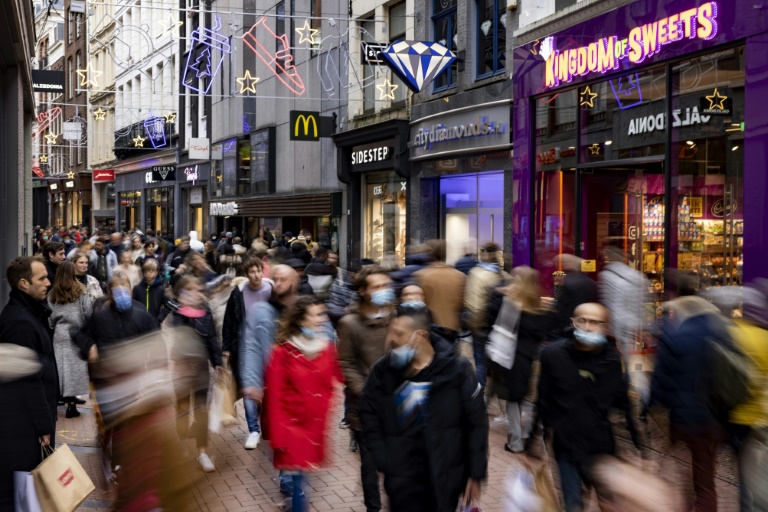Even before it became a hotspot for Omicron variant cases, the Netherlands was one of the countries worst hit by the latest wave of Covid-19.
Experts say that the spike despite an 85 percent adult vaccination rate is partly due to very Dutch ideas of personal freedom and social responsibility.
Masks often remain unworn and Covid passes unchecked as the government shies away from enforcing its guidelines.
This approach reflects a long-standing reliance on a “social contract” between citizens and authorities to keep this low-lying nation’s head above the waves.
At the start of the pandemic, Prime Minister Mark Rutte announced an “intelligent lockdown” that was more lax than much of Europe.
“We don’t work like that in the Netherlands, where the government says ‘you have to do this, you have to do that,'” Rutte said in March 2020.
At first the Dutch, used to a highly consensual political system, complied.
“We were shoulder to shoulder against the virus,” recalls Mark Bonten, an epidemiologist and government adviser.
– ‘Aversion to rules’ –
But things have changed since then, with the increasingly unpopular Dutch government caught in a cycle of lifting restrictions too quickly, and then reimposing them.
Cases recently soared to record daily levels of more than 20,000 cases in a country of 17 million people. The Netherlands had the fourth most cases per 100,000 inhabitants in Europe over the past week, according to an AFP database.
Hospital intensive care units have become overwhelmed, operations have been cancelled while the army has been brought in to help.
The Netherlands has also suffered some of its worst riots in decades, most recently when violence erupted in several cities in November.
The goodwill towards the government’s restrictions has “dramatically eroded”, Bonten said.
“Dutch people cherish their autonomy. Free will is in the nature of the country.”
Epidemiologist Frits Rosendaal highlights the contrast between the Netherlands and Mediterranean countries such as Italy, which were badly hit by the first wave of Covid and are now more likely to respect Covid measures.
“There is aversion to the rules, and aversion from the people in power to enforce the rules,” the Leiden University scientist told AFP. “There is no other difference with the other countries. This is just behaviour.”
The Dutch government declined to comment despite multiple requests by AFP.
– ‘Stick to the measures’ –
Dutch authorities insist on the success of their vaccination campaign, which has now jabbed 85 percent of adults despite getting off to one of the slowest starts in Europe.
The remaining portion of unvaccinated people “accounts for 70 percent of the hospitalisation in intensive care”, Aura Timen, infectious diseases chief of the RIVM National Public Health Institute, told AFP.
A combination of other factors is also at play, including that vaccines do not offer absolute protection; the infectiousness of the Delta variant; the Netherlands’ high population density; and the increased spread of the virus in winter.
But Timen also placed the onus on Dutch people to stick to the government’s newest restrictions, under which shops and restaurants close at 5pm.
“I hope that people in the Netherlands will stick to the measures, because they only work if people comply with them,” Timen added.
Cases “stabilised” last week in the wake of a first set of Covid curbs, rising by just one percent to 155,152, compared to a leap of 39 percent the week before, the RIVM said.
The restrictions should “also work in controlling the further spread of the Omicron variant,” Timen said.
Whether the Dutch will do so remains to be seen, in the view of one businessman who runs a Covid testing centre in the Amsterdam suburbs.
Asking to be identified only as Jan, he says he does not ask his clients for a coronavirus pass and he shakes their hands “but cleans them afterwards.”
His shop has stayed open during lockdowns, but he and his employees get tested every day.
“I use my intellect,” says Jan, who has not been jabbed and will not allow his children to get Covid shots, although he is not against vaccination in principle.
“I don’t automatically conclude that following the rules is the right answer.”









